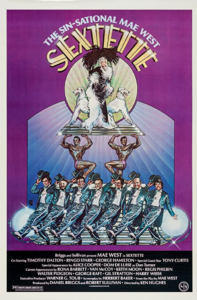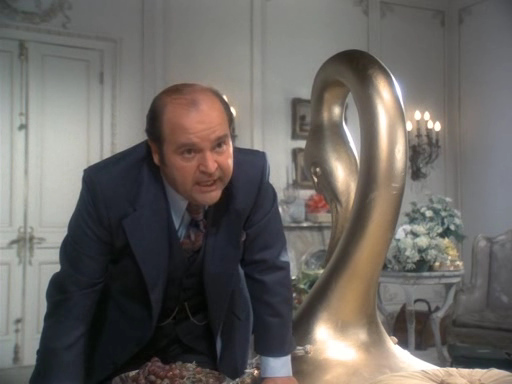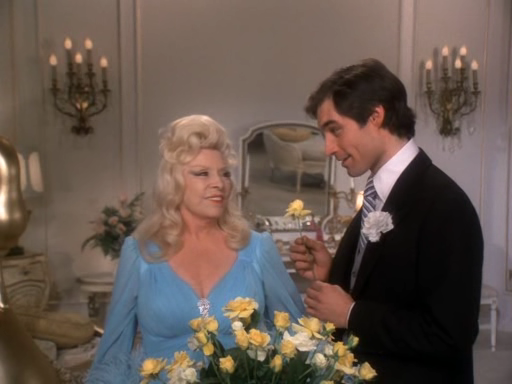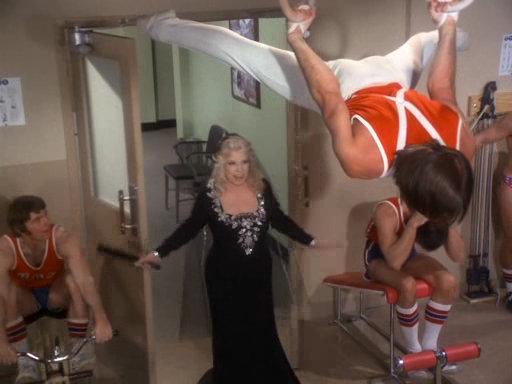Sextette (1978)
“Marriage is like a book: the whole story takes place between the covers.”
|
Synopsis: |
|
Genres, Themes, Actors, and Directors:
Response to Peary’s Review: As narratives go, the story — based on a play written by West — isn’t really all that terrible: it’s a zany farce full of double entendres, sexual innuendos, and innocuous musical numbers, and director Ken Hughes moves everything along at a fast clip. The “problem”, of course, is in the casting of West herself, whose advanced age defies our sense of sexual “normalcy” and “propriety”. Could Sextette be viewed as the ultimate May/Mae-December romance? It’s too bad, in a way, that West’s “real” age — or even something reasonably close to it — is never made explicit in the film, because a movie about an acknowledged octogenarian sexpot-actress would really be something! Unfortunately, West’s performance here is passable at best — and while it lies at the center of the film’s fame, it’s sadly (almost comically) one-note. She struts creakedly across the elaborate sets, attempting to infuse some pizazz into her lines (many of which are cribbed directly from her earlier films), but since she only has one frozen expression, and a few familiar mannerisms (gently patting her hilarious pouf of a blonde wig, pursing her lips, rolling her eyes upwards), she’s more like a moving, talking statue than a viable living creature — wind her up and she’ll spout quips like the following (chosen at random as a representative sample):
Faring much, much better than West are her numerous male co-stars, who deserve major kudos for being so incredibly game. Dom DeLuise is amusingly sincere as West’s loyal assistant (secretly in love with her, as he reveals in a singing solo), while young Dalton has completely redeemed himself in my eyes after the debacle of his early performance as Heathcliff in Wuthering Heights (1970). He’s a Bond who can sing! (anyone who’s seen Pierce Brosnan in Mamma Mia! will understand the reference). Meanwhile, both Tony Curtis and George Hamilton seem to be having great fun making brief appearances as two of West’s former husbands (both, naturally, still in love/lust with her). Redeeming Qualities and Moments:
Must See? Categories
Links: |







One thought on “Sextette (1978)”
In total agreement. A once-must.
~and it’s true; West is the film’s liability. I won’t say she’s insufferable (although I’ve never really ‘gotten’ her appeal – except for the fact that she was a brazen force on-screen in the ’30s-’40s). But, oddly, she doesn’t even really seem to be having much fun here (and, again, gives off the air of expecting to be adored; for all her come-on talk about sex, she has never seemed very welcoming to me – just indifferent in her placid vulgarity). The most alive she seems to get is in the sequence with the gymnasts – which is more than vaguely reminiscent of Jane Russell singing ‘Ain’t There Anyone Here For Love?’ in ‘Gentlemen Prefer Blondes’.
The film is carried off by just about everybody else in it, down to the dancers. For those surrounding West, the word used in the assessment is apt: they’re all “game”. Which is why ‘Sextette’ isn’t camp: everybody is in on the joke – and the joke is not half-bad. The script is a decent one – for what it is – and the time does fly by reasonably well.
The male lead/supporting stars do come off rather well, surprisingly. Though not noted, I even like Ringo Starr here (he shows up in the darnedest films, doesn’t he?), and Alice Cooper (completely minus his usual stage makeup) singing the film’s theme song near the end. A personal highlight for me is the adorable DeLuise singing McCartney’s ‘Honey Pie’ – and even tap-dancing atop a piano. As noted, Curtis and Hamilton do appear to be having quite a bit of particular fun. (The film’s funniest ‘bit’ goes to Dalton. Unfamiliar with American slang, Dalton leads the media to believe he’s gay – then bisexual. Thus, things do get a bit complicated for him. This is all handled rather well.)
All told, ‘Sexette’ is pleasant enough to get through and should be seen by all ffs – not that you’ll want to go back to it, necessarily, but it’s one-of-a-kind.
Note: I looked West up at the IMDb to learn a little more about her ‘significance’ in cinema history. The most interesting bit of trivia is that her films ‘She Done Him Wrong’ and ‘I’m No Angel’ led to the Motion Picture Production Code. Unlike many actresses of her day, West was primarily a writer. Her stock-in-trade was sex-sex-sex. She was never much of an actress, but she probably does deserve credit for breaking down sexual boundaries.
A little side-note: West made her first film with George Raft in 1932 – as well as her last, this one. Raft appears briefly but charmingly in an elevator sequence.